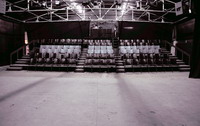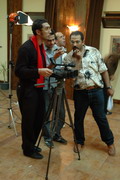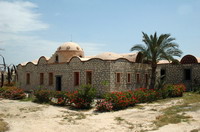An account of the revival


Jumbled Colours, directed by Ramez Mikhael, photography by Islam Ayad

Studio Iskandariya
Since filmmakers and actors moved to Cairo and elsewhere from the 1930s onwards, Alexandria continued to nourish the capital with photographers, directors, producers and, of course, actors. But though the cinema as an industry has been dormant in Alexandria for close on seventy years now, it shows faint signs of waking up from its long sleep. As in the early years of Alexandrian filmmaking, which were at the turn of the last century, the attempts being made at the turn of this century are modest and experimental, but full of promise.
A collective experience of movie making was undertaken at the Jesuit Cultural Centre, which has always been a venue for cinema lovers. The late Frère Fayez el Yassouey himself had a keen interest in cinema, and had in 2000 produced and directed a hundred minute long VHS documentary for which he wrote the script and commentary, called Bread and Salt (el Eish Wel Malh), dealing with the Moslem and Christian underprivileged classes across Egypt. The perfect embodiment of a monk devoted to community service, he was particularly interested in helping ambitious young Alexandrians make their first films. He organized a two-year workshop (2002-2004) on “How to make your first film” with Cairo-based SEMAT for Production and Distribution (two of whose founders and co- founders Islam el Azzazi and Ahmed Abou Zeid, incidentally, are Alexandrian). After two years of intensive training at the Jesuit Cultural Centre, the young Alexandrians made their first films.
The Elevator
Directed by: Hadeel Nazmy
12 mins
Icarus
Directed by: Islam Kamal
Sikotein 10.5 mm
Directed by: Mohamed Salah
20 mins
The Dead Won't Mind
Directed by: Emad Mabrouk
10 mins
Shadow from Afar
Directed by: Mohamed Rashad
20 mins
Endymion
Directed by: Mohamed Siam
20 mins
Real One
Directed by: Kaiser
The Puppet Imaginary
Directed by: Yafa Guilly
20 mins
Master of the Game
Directed by: Ahmed el Samra
20 mins
These films have drawn attention to Alexandria and its capacity for filmmaking, and have inspired other Alexandrian youth to capitalize on the invention of the video camera to make their own films.
It remains to be seen whether they will move to Cairo as their predecessors had done, or make a serious attempt at the revival of cinema in the city of its birth. Although some of them are pessimistic about the future of the industry in Alexandria, and others have still not made up their minds, Alexandria is firmly engraved on their hearts and minds. They believe they cannot make films if they are far from the city of their dreams, the city that inspired them.
They call themselves filmmakers rather than directors, as they use only use video, not 16 mm or 35 mm cameras, to make their low budget movies. Funding, however, remains a problem for them. They have many hopes and little money, which they compensate for with ambition, love for cinema and team spirit. A look at the credits of their films will reveal that their names alternate in many roles, recalling Togo Mizrahi, Mohamed Bayoumi, the Lama brothers and others who worked as directors, scriptwriters, editors, cameramen and actors. They have gone back to the spirit of the amateur.
Also in the spirit of the old days, when women such as Bahiga Hafez and Fatma Rushdi made significant contributions to cinema, the young women of today continue to prove their mettle. The workshop boasted among its participants two young women of talent, Yafa Guilly and Hadeel Nazmy, whose film The Elevator has already received critical acclaim and numerous awards:
- 5th Arab Film Festival
Rotterdam - 2005
“Golden Falcon in Short Narrative Competition”
- 11th National Festival for Egyptian Cinema
Cairo - 2005
“Shadi Abdel Salam Award for Short Narrative Film”
- 2nd Sakia Festival for Independent Films Cairo - 2005 “Golden Award”
Mention for "Laila Samy" the actress for her role in the film
- Festival of Image
CFCC - French Centre for Culture and CooperationCairo - 2005
Mention for "Laila Samy" the actress for her role in the film
- 2nd Fayoum International Youth Film Festival - 2005
“Golden Award in Short Narrative Competition”
Second Workshop 2005-2007
Encouraged by the success of the workshop, the Jesuit Cultural Centre started another one in 2005. It is being run by Islam el Azzazi, himself an Alexandrian who is now working in SEMAT, Cairo. The seven participants are: Islam Ayyad, Mark Lotfi, Belal Hosni, Abdullah Sharkas, Ayman el Amir, Ramez Mikhael and Ahmed Nabil.
If the group at the Jesuit Cultural Centre made their films in Alexandria and are trying to start some kind of revival in the city itself, other Alexandrians are beginning to establish a career in Cairo. Starting with short films and documentaries, like their Jesuit Cultural Centre counterparts – and, also, like the very first attempts at filmmaking – some have gone from 6 minute to 50 minute films. They are winning both recognition and awards.
Ahmed Rashwan (1969)
After earning a law degree from Alexandria University in 1990, Rashwan proceeded to earn another one from the Film Directing Department of the High Cinema Institute, Cairo in 1994. He worked as assistant director with Samir Seif, Sayed Said and Mohamed Khan, in addition to directing his own films, which number 19 till now. Since 1999 he has owned and managed his company Dream Productions in Cairo. He has worked as production manager and executive producer in several foreign and Arab productions in America and Tunisia, and his films have participated and received awards in a number of national and international film festivals. His feature film script 100% Alive (Miyya el Miyya Hayy) has been awarded a prize at the scriptwriting workshop competition of the International Alexandria Film Festival 2003. The Morning After (El Sabah el Tali) was screened in the 15th Exground Filmfest, Wiesbaden, Germany 2002 and at the 16th Ismailia International Festival in the Arab Independent Cinema Section, Egypt 2002; and Iraq, We Never Parted (Abadan Lam Nufariqahu) at the Arab Film Festival, Rotterdam, Netherlands 2005 and the 11th Egyptian Film Festival, 2005.
Filmography
Director
Musafir Khana (Musafir khana) (1993, doc, 16 mm, 9 min)
Habiba’s Birthday (Eid milad Habiba) (1993, Bcam SP, 14 min)
Zamzam (1994, 35 mm, 12 min)
Farah’s Dreams (Ahlam Farah) (1994, Bcam SP, 15 min)
Cross Roads (Moftaraq el toroq) (1995, 35 mm, 8 min)
Inside People (Gowa el bashar) (1998, doc, 35 mm, 16 min)
A Day like any other Day (Yom kamithl ay yom) (2000, doc, miniDV, 23 min)
Once I Entered the Garden (Dakhalt marra el guineinah) (2000, doc, 35 mm, 10 min)
The Morning After (El sabah el tali) (2002, miniDV, 16 min)
The Law of Coincidence (Qanoun el sodfa) (2003, doc, minDV, 11 min)
Beirut: Take 1 (Beirut: awel marra) (2004, doc, miniDV, 16 min)
Arabs of Latin America documentary series: Ecuador (Selselet arab amrika el latiniah – Ecuador)
Women and Roots (el Nnissa’ wa gothourihem) (2004, doc, DigiBeta, 50 min)
The Station (El mehata) (2004, doc, Digibeta, 50 min)
Gayaquiel: Arabs of Power and Wealth (Gayaquiel: arab el qowa wal sehha) (2004, doc, DigiBeta, 50 min)
Iraq, We Never Parted (Abadan lam naftareq) (2004, doc, miniDV, 28 min)
Saad Kafrawi: Literature of Prison (Saad Kafrawi: adab el segn) (2005, doc, DigiBeta, 48 min)
Hassan Fathy, it’s Time for the Construction to be Completed (Hassan Fathy, ennahu el waqt liyaktamel el bouna’) (2005, doc, DigiBeta, 52 min)
Producer
The Morning After (El sabah el tali) (2002, miniDV, 16 min)
The Law of Coincidence (Qanoun el sodfa) (2003, doc, minDV, 11 min)
Without Makeup (Bedoun makyaj) (2003, miniDV, 19 min, wr/dr Hussam Nur el Din)
Iraq, We Never Parted (Abadan lam naftareq) (2004, doc, miniDV, 28 min)
Executive Producer
Saad Kafrawi: Literature of Prison (Saad Kafrawi: adab el segn) (2005, doc, DigiBeta, 48 min)
Hassan Fathy, it’s Time for the Construction to be Completed (Hassan Fathy, ennahu el waqt liyaktamel el bouna’) (2005, doc, DigiBeta, 52 min)
Islam el Azzazi (1971)
Born in Alexandria in 1971, el Azzazi earned a BA (1993) in film directing from the High Cinema Institute and since his Dostoevsky-inspired graduation project The Beads (el Kharaz), he has directed a further three promotional and documentary films. El Azzazi has coached actors, photographed and filmed theatrical productions and directed the Arabic dialogue of Disney animation classics. He is a founding member of the independent film production group SEMAT for production and distribution, and has supervised two filmmaking workshops organized by the Jesuits Cultural Centre of Alexandria.
Filmography
March (Maress) (1992, 35 mm, 3 min)
The Beads (el Kharaz) (1993, 35 mm, 18 min)
City of Shadow (Madina yaskonha el thel) (1994, doc, VHS, 20 min)
Fayyoum Portraits (Wogouh el Fayyoum) (2000, doc, DigiBeta, 24 min)
Dominate your Eyes (Ithakem fi ‘eineik) (2003, doc, DVcam, 45 min)
Day and Night (Nehar we leil) (2006, DVcam, 35 min)
Louly Seif (1976)
Louly Seif was born in Alexandria and graduated from the American University in Cairo with a degree in anthropology and a minor in film. She worked in the field of development, human rights and refugee rights before she started working as an independent film director and editor.
More Lights Please (Ida’a akthar men fadlak) (2002)
Resurrection (el Baath) (2..3, miniDV)
Ahmed Abou Zeid (1976)
Alexandrian born Abou Zeid studied Mass Communication in Cairo and got his degree in 1988, after which he worked as an assistant director (1988-1991) in several TV and film productions in Egypt. In 1991, he travelled to New York where he earned a diploma in TV and video directing and another in film directing. While there, he worked as an assistant director in several independent films, as well as writing and directing the documentary Invalid Dreams (1993) about the life of immigrant Egyptians in New York. After returning to Egypt he wrote and directed a number of short films besides working as a director for the Egyptian Television Thematic Channels (1996-2000). In 2001 he established, along with a group of filmmakers, the first independent production company in Egypt, SEMAT.
Filmography
Screenwriter/Director
The White Dove (el Hamama el beida) (1995, 16 mm, 15 min)
Engravings on a Ray of Light (el Hafr ‘ala sho‘a‘ men el do’) (1997, doc. Bcam Sp, 50 min)
The Street Entertainer (el Hawi) (1999, doc, DigiBeta, 10 min)
Palestine … 52 Years of Occupation (Filistine: 52 sana men el ihtilal) (2000, DigiBeta, 10 min)
From Afar: Trilogy of Alexandria (Men ba‘eed: tholathiyet Iskindariyah) (2002, DigiBeta, 45 min)
Producer
A Glimpse at the Sky. Dir. Kamla Abou Zikri (2003).
But if a revival is really to be brought about in Alexandria, and if it is to become a centre once more for the cinema industry, rather than a supplier of actors and cinematographers, a proper studio has to start functioning. Without a studio, all talent will eventually go to Cairo in search of professional equipment. For now, a small ‘ studio’ in Sidi Bishr serves the purpose with basic equipment that the young and enthusiastic will make do with. Much like in the old days when studios had glass ceilings and were covered in mirrors as reflectors, also using aluminum sheets and later foil for the same purpose, a practice still carried out today .
Young filmmakers from abroad now come to shoot their experimental
work or medium length films relying on the services of the amateur studio and the expertise of its young owner Marc Loutfi, and together with the budding young Alexandrian artists and technicians, they all team up with the city providing more than just the location. All this being reminiscent of the early period, with a cycle coming perhaps full circle. Cinema expert Ahmed Metwalli, director Ali Badrkhan and star Nour el Sherif have actually taken that step and gone as far as build Studio Iskandariya in Amriyeh, but red tape seems to have sealed their fate and doomed it to death. The buildings stand, empty and uninhabited, awaiting the release from bureaucracy that may grant it and Alexandrian filmmaking a new lease of life.

